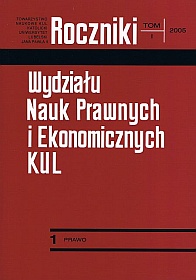Differentia Specifica of the Budget Act According to Polish Constitution
Abstract
According to Polish constitution the Budget act is one of acts in genere. Nonetheless some features of the Budget act (also mini-budget act) which differ it from the other acts make this act special, clearly differing it from the others. The differences between usual acts and the Budget act concern, most of all, legislative procedure. Firstly, the Budget bill may be submitted into the Sejm only by the Cabinet. Secondly, passing this bill and submitting it for President's approval should occur within four months since submitting the bill to the Sejm. Otherwise, President may shorten the term of parliament. Thirdly, the Senate has only twenty, instead of thirty, days to examine the Budget act handed over by the Sejm. The Senate can't reject the Budget act as well. Fourthly, President has only seven, instead of twenty one, days to sign the act and he hasn't the power of veto (he can't veto this act). Fifthly, Constitutional Tribunal has only two months to pass a sentence on the Budget act accord with constitution. The Budget act has also exceptional content which determines as with content of many other acts and execution of their regulations, so with activity of governing body, especially executive one which executes the Budget act. The way in which execution of the Budget act is controlled is different as well. Controlling execution of the Budget act, the Sejm also controls simultaneously the Cabinet which is responsible for executing the Budget act. Moreover, not every regulation of the Budget act has general and abstract character which is typical for acts regulations. Finally, the Budget act is always passed for time determined by constitution in advance, that is for budgetary year which is the same as calendar year. Exceptionally it may go to effects for shorter time than budgetary year (mini-budget act).
All those differences weigh in favour of treating the Budget act as a sui generis act. Nevertheless they don't justify treating the Budget act as a source of law different from other acts. In other words, the Budget act has the same force of law as other acts, occupying the same position in hierarchy of law sources.
References
Bałaban A.: Prawny charakter i funkcje ustawy budżetowej, w: Konstytucyjna regulacja ustroju społeczno-gospodarczego i finansów publicznych, red. G. Kruszeń, E. Zwierzchowski. Białystok: Temida2 1996.
Czarny P.: Sejm i Senat. W: Prawo konstytucyjne Rzeczypospolitej Polskiej, red. P. Sarnecki, Warszawa: Wydawnictwo C.H. Beck 2004.
Dębowska-Romanowska T.: Cechy ustawy budżetowej i budżetu wświetle art. 219 Konstytucji RP, „Państwo i Prawo” 2000, nr 5.
Dębowska-Romanowska T.: Pojęcie budżetu i ustawy budżetowej, w: Prawo finansowe, red. W. Wojtowicz, Warszawa: Wydawnictwo C. H. Beck 2000.
Dobrowolski M.: Konstytucyjne aspekty procedury uchwalania ustawy budżetowej, w: Ius et veritas. Księga poświęcona pamięci Michała Stasiewicza, red. D. Dudek, A. Janicka, W. Sz. Staszewski, Lublin: Wydawnictwo KUL 2003.
Dudek D.: Prawo konstytucyjne w zarysie. Wybór źródeł, Lublin: LWP 2002.
Garlicki L.: Polskie prawo konstytucyjne. Zarys wykładu, Warszawa: Liber 2004.
Gdulewicz E., Granat M., Orłowski W.: Sejm i Senat, w: Polskie prawo konstytucyjne, red. W. Skrzydło, Lublin: Wydawnictwo Morpol 2002.
Gdulewicz E., Zakrzewski W.: Źródła prawa konstytucyjnego, w:Polskie prawo konstytucyjne, red. W. Skrzydło, Lublin: Wydawnictwo Morpol 2002.
Górzyńska T.: Zasada praworządności i legalności, w: Zasady podstawowe polskiej konstytucji, red. W. Sokolewicz, Warszawa: Wydawnictwo Sejmowe 1998.
Kojder A.: Godność i siła prawa. Szkice socjologiczno-prawne, Warszawa: Oficyna Naukowa 1995.
Konstytucja Rzeczypospolitej Polskiej z 2 kwietnia 1997 r. (Dz.U. 1997, nr 78, poz. 483).
Kosikowski C.: Finanse publiczne w świetle Konstytucji RP oraz orzecznictwa Trybunału Konstytucyjnego (na tle porównawczym), Warszawa: Wydawnictwo Sejmowe 2004.
Kosikowski C.: Odmienności w tworzeniu ustawy budżetowej, „Przegląd Sejmowy” 1998, nr 4.
Kulig A.: Rada Ministrów. W: Prawo konstytucyjne Rzeczypospolitej Polskiej, red. P. Sarnecki, Warszawa: Wydawnictwo C. H. Beck 2004.
Lassalle F.: O istocie konstytucji, Warszawa: PWN 1960.
Mazurkiewicz A.: Konstytucyjne problemy deficytu budżetowego w orzecznictwie Trybunału Konstytucyjnego, w: Prawo wyborcze Rzeczypospolitej Polskiej i problemy akcesji Polski do Unii Europejskiej, red. A. Sylwestrzak, Olsztyn: Wydawnictwo Uniwersytetu Warmińsko-Mazurskiego 2003.
Miemiec W.: Teza I do art. 222, w: Konstytucje Rzeczypospolitej oraz komentarz do Konstytucji RP z 1997 roku, red. J. Boć, Wrocław: Kolonia Limited 1998.
Miemiec W.: Teza I do art. 225, w: Konstytucje Rzeczypospolitej oraz komentarz do Konstytucji RP z 1997 roku, red. J. Boć, Wrocław: Kolonia Limited 1998.
Miemiec W.: Teza II do art. 219, w: Konstytucje Rzeczypospolitej oraz komentarz do Konstytucji RP z 1997 roku, red. J. Boć, Wrocław: Kolonia Limited 1998.
Miemiec W.: Teza IV do art. 219, w: Konstytucje Rzeczypospolitej oraz komentarz do Konstytucji RP z 1997 roku, red. J. Boć, Wrocław: Kolonia Limited 1998.
Sarnecki P.: Zakres działania i funkcje Rady Ministrów, w: Rada Ministrów. Organizacja i funkcjonowanie, red. A. Bałaban, Kraków: Kantor Wydawniczy Zakamycze 2002.
Sylwestrzak A.: Konstytucja RP z 1997 roku a kontrola publiczna na tle reformy terytorialnej z 1998 roku, w: Konstytucyjny ustrój państwa. Księga jubileuszowa Profesora Wiesława Skrzydły, red. T. Bojarski, E. Gdulewicz, J. Szreniawski, Lublin: Wydawnictwo UMCS 2000.
Tuleja P.: Źródła prawa, w: Prawo konstytucyjne Rzeczypospolitej Polskiej, Red. P. Sarnecki, Warszawa: Wydawnictwo C. H. Beck 2004.
Winczorek P.: Komentarz do Konstytucji Rzeczypospolitej Polskiej z dnia 2 kwietnia 1997 r., Warszawa: Liber 2000.
Zubik M.: Deficyt budżetowy. Uwagi na tle polskich doświadczeń ustrojowych, w: Prawo wyborcze Rzeczypospolitej Polskiej i problemy akcesji Polski do Unii Europejskiej, red. A. Sylwestrzak, Olsztyn: Wydawnictwo Uniwersytetu Warmińsko-Mazurskiego 2003.
Zubik M.: Problem deficytu budżetowego w Konstytucji RP, „Państwo i Prawo” 2000, nr 6.
Zubik M.: Wybrane aspekty instytucji budżetu państwa w nowych rozwiązaniach konstytucyjnych i ustawowych, „Państwo i Prawo” 1999, nr 8.
Copyright (c) 2005 Roczniki Wydziału Nauk Prawnych i Ekonomicznych KUL

This work is licensed under a Creative Commons Attribution-NonCommercial-NoDerivatives 4.0 International License.

